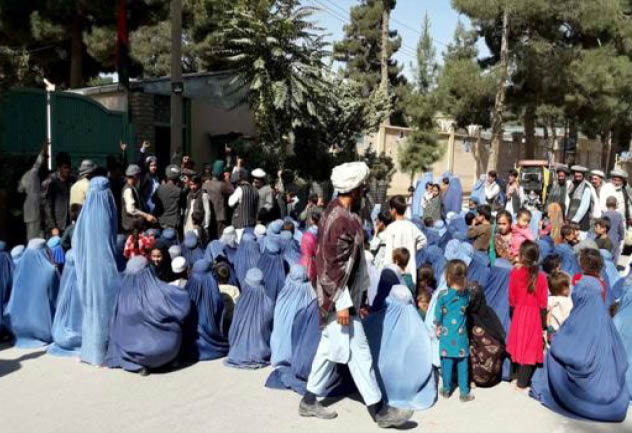KABUL - To help the most vulnerable families including those recently returning from Pakistan and Iran, aid agencies in Afghanistan need $430 million this year, the United Nations said Monday.
The money will be used to assist 2.8 million people displaced by conflict or natural disasters with emergency shelter and food,” a statement from the UN Office for the Coordination of Humanitarian Affairs (UNOCHA) said in a statement.
The assistance will go to treatment of patients injured by conflict, to feed malnourished children or assist vulnerable families returning home after years in Iran or Pakistan, the statement added.
“In many parts of Afghanistan, violence continues unabated and people need support more than ever,” said Toby Lanzer, the UN Humanitarian Coordinator in Afghanistan.
“Today I call on international donors to stand by 2.8 million people whose lives have been ruined by conflict or natural disaster, and to help people returning to Afghanistan from neighbouring countries.”
Armed clashes in the past year were the highest in a decade and civilian casualties remained near record levels.
More than two million people were directly affected by the conflict last year, 448,000 of whom had to abandon their homes to save their lives.
More than 500,000 people arrived in Afghanistan in 2017, many of them after seeking refuge in Iran, Pakistan or other countries.
“The international community has proven its continued commitment to the people of Afghanistan with generous humanitarian funding of $317 million in 2017,” said Chief Executive Officer Abdullah Abdullah.
“The Humanitarian Response Plan launched today will serve to provide timely, life-saving assistance to families in emergency shelters or in need of urgent support across the country,” he said.
The response plan puts forward activities of more than 150 humanitarian partners - national and international humanitarian NGOs and the United Nations - delivering assistance to families and communities in need wherever they can be reached, despite difficult conditions including increasing attacks on aid workers.
“The Humanitarian Response Plan is a crucial part of the response to the human suffering and the ongoing crisis in Afghanistan,” said Swedish Ambassador to Afghanistan, Tobias Thyberg. “After decades of conflict, we may not abandon people and saving lives with immediate assistance must remain our highest priority.”
This year’s Humanitarian Response Plan focuses only on providing life-saving emergency assistance to people caught up in current or very recent disasters.
Besides the 2.8 million people the plan is designed for, another 8.7 million people are estimated to live with high level of needs as a result of long-standing and unresolved issues such as lack of jobs and livelihoods, long-term displacement, an underfunded healthcare system or the effects of climate change.
Humanitarian emergency assistance cannot provide a solution for such chronic needs, like land for housing or jobs and vocational training to lift them out of poverty and fragility.
The government, supported by development partners and the United Nations, is working to improve these underlying conditions, namely via the Afghanistan National Peace and Development Framework.
The Humanitarian Response Plan for Afghanistan is one of more than two dozen such plans this year, requesting a total of U$22.58 billion to assist 90.9 million people globally.
The plans ensure joint humanitarian action in crises caused by conflict or natural disasters and are the humanitarian community’s main tool to rise funding with donors and ensure accountability towards the people served and donors. (Pajhwok)
Home » Afghanistan » Afghanistan Needs $430m in Humanitarian Aid this Year
Afghanistan Needs $430m in Humanitarian Aid this Year

